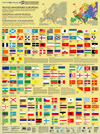EU status for Catalan, Basque and Galician

There have been further developments on Spanish government decision at the inter-governmental conference (IGC) for recognition at the EU level of the official languages in Spain other than Spanish, that is Basque, Catalan and Galician. The aim is to give these languages a similar status to Irish. While European Parliament leader Pat Cox warmly welcomed the proposal in Catalonia, French Foreign Minister, Michel Barnier, warned against the «reopening of difficult issues».
At the IGC, the body responsible for matters relating to the Draft Constitution, the Spanish Prime Minister presented to other state leaders the text named «Statute of Spanish state languages in the EU, other than Spanish». It proposes that the future Constitutional treaty will be translated into Catalan, Galician and Basque, and that citizens will have the right to address the institutions, and receive information from them, in these languages.
If the proposal succeeds, upon unanimity of the European Council, these languages would then have official status, although they would not be working languages. The status they would gain would be at the discretion of each states government, making it similar, although not equal to, Irish.
Irish is not one of the 20 official EU languages but has been recognised as a special case. For example, the public can use it to correspond with European institutions.
The plan, from Spain's new government, headed by Jose Luis Rodriguez Zapatero, aims to add a clause to the EU's draft constitution allowing each member state to nominate the languages into which documents would be translated, at that states expense.
Presently there are already some reactions to the Spanish Prime Ministers decision. The European Commission considers that this linguistic issue only concerns the member states, even if the European executive has in the past, to a certain extent, co-funded the translation of European treaties. The Commission has asked for a protocol to be attached to the Constitution saying that member states should provide help with the financial costs.
In addition, according to yesterdays Catalan press, Mr. Michel Barnier, the French Foreign Minister and former EU commissioner, said that it was important to avoid to re-opening difficult issues in the run-up to the final approval of the EU Constitution. Mr. Barnier asked for prudence from EU member states when making proposals on EU linguistic rules. It suggests that France may prove to be an obstacle to future progressive language measures.
Meanwhile in Barcelona yesterday European Parliament President Pat Cox met Catalan President Ernest Benach and confirmed that Catalan should have EU official status if the Spanish Government agrees.
While Catalan, Basque and Galician have been put forward by the new Spanish government it is certain that other governments in Europe will face pressure to give the same rights to their minoritised languages. For example, there have already been calls for Welsh to have official status.
Considering the importance of these developments for all of Europes minoritised languages Eurolang felt it wise to add that two misleading reports known to us from an English newspaper, The Independent, state that Catalan, Basque and Galician have already become official at the EU level. For our readers clarification, this is untrue. Negotiations are in progress and clearly from Michel Barniers reaction they still have some way to go.
From: www.eurominority.org



